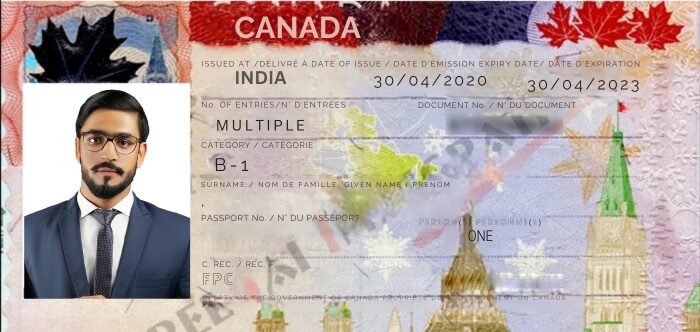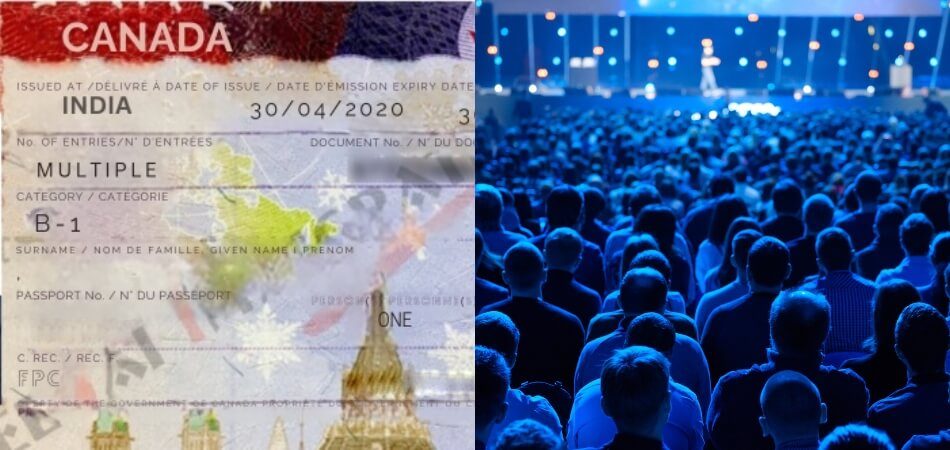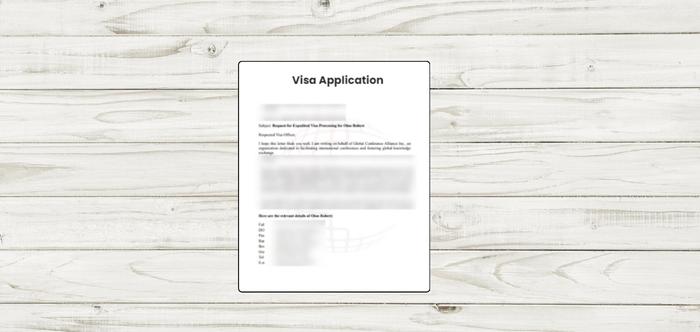There is no denying Canada’s appeal as a location for international gatherings and conferences. With its rich culture and diverse landscape, many professionals worldwide, especially from India, often look forward to attending events in this North American nation. But a crucial question arises: Is it easy to get a Canadian conference visa for Indians?
Over the past decade, the dynamics have shifted. Getting a Canadian Conference Visa for Indians has become more challenging. The IRCC data indicates a decline in approval rates from 82% in 2011 to 66% by 2020, suggesting stricter rules or requirements.
But what does this mean for potential Indian delegates wishing to attend conferences in Canada? Dive deeper into our blog, where we unravel the intricacies of the process and offer invaluable insights. Your successful application might just be a few tips away.
The Importance of Canadian Conference Visa for Indians
The Canadian Conference Visa holds significant importance for Indians eager to participate in conferences and events hosted in Canada. This visa facilitates international collaboration, knowledge exchange, and professional growth. Understanding its value is crucial for prospective attendees.
Enhancing Professional Network
Attending Canadian conferences opens doors to global networking opportunities. Indians can meet industry leaders, potential clients, and collaborators. Such interactions boost their professional contacts. An expanded network often leads to collaborative ventures.
Exposure to International Standards
Canadian events showcase global best practices. Indians attending these gain insights into international benchmarks. This knowledge elevates their expertise. Implementing these standards in India can lead to quality enhancements.
Skill Development and Training
Many Canadian conferences offer specialized training sessions. Indians can acquire new skills and refine existing ones. This continuous learning enriches their professional profiles. Employers often value such international training experiences.
Economic Opportunities
Besides knowledge-sharing, conferences can be business opportunities. Indians can explore trade partnerships and potential investments. For those attending a Canada conference with invitation letter, this formal invitation often enhances their chances of obtaining a visa. Understanding Canadian market dynamics can guide future business strategies as well.
Cultural Exchange
Attending events in Canada promotes cultural understanding. Indians experience Canadian traditions and share their own. This mutual exchange fosters respect and camaraderie. It also aids in smoother business relations.
Canadian Conference Visa is more than just a travel document for Indians. It’s a ticket to knowledge, growth, and global recognition.
Is it Easy to Get a Canadian Conference Visa for Indians?
Professionals from India in particular have found Canada to be a hub for its top-notch conferences. With all of this attention, a lot of people are wondering, Is it easy to get a Canadian conference visa for Indians? Put simply: things aren’t as simple as they once were. So let’s take a closer look.
Years ago, securing this visa was a smoother sail. However, recent IRCC stats tell a different tale. From a hearty approval rate of 82% in 2011, there’s been a dip to 66% by 2020. This change hints at a tighter grip on rules. Things like detailed paperwork, a closer look at applications, and changing global scenarios have made it trickier.
But here’s the thing, despite these challenges, the Canadian Conference Visa is still in high demand among Indians. Why? Well, these events aren’t just about listening to talks. They’re gateways to mingle with global experts, soak up fresh ideas, and maybe even kick off new business chats. It’s a mix of learning and networking that’s hard to resist.
For anyone keen on this adventure, a bit of homework goes a long way. Dotting the i’s, crossing the t’s, and keeping tabs on the latest visa news can boost one’s chances. It might sound like a bit of a juggle, but the experiences waiting on the other side? Totally worth the effort!
Eligibility Criteria for Canadian Conference Visa
Canada’s conference circuit is a magnet for global professionals, with its promise of learning and networking. For those keen on this opportunity, understanding the eligibility criteria is crucial. Let’s break down the essentials for the Canadian Conference Visa.
Valid Passport
Every applicant needs a valid passport, and their key to international travel. It should stay valid for a minimum of six months beyond your expected return date. A couple of blank pages are essential for visa stamping. Previous passports, if any, should be presented, revealing your travel history.
Proof of Conference Registration
To attend, one must have registered for the conference. Furnish proof, whether it’s an invitation letter or a purchased ticket. This document should clearly outline event specifics, like venue and dates. Ensure clarity; a blurred or unclear document might raise eyebrows.
Financial Proof
The Canadian government wants assurance you can afford the trip. This means bank statements, salary slips, or sponsorship letters. These documents should show sufficient funds for your stay. A steady financial record can enhance approval chances.
Employment and Leave Verification
If employed, produce an employment verification letter. This confirms your role, salary, and employment duration. A leave sanction letter from the employer is also necessary. It assures your intention to return after the event.
Intent to Return
Show strong ties to your home country. This can be in the form of property documents, family connections, or ongoing job contracts. The idea is to ensure you’ll return post-conference. When following the process for Canada conference visa from India, these strong ties reduce the risk of visa rejection.
No Criminal Record
Safety first says Canada. Hence, aspiring attendees must produce a police clearance certificate. This document testifies to your clean chit on the criminal front. Remember, any glitches or adverse records might just slam the visa doors shut.
The pathway to the Canadian Conference Visa is paved with precise documentation and genuine intent demonstrations. With all eligibility boxes checked, one can confidently anticipate an enriching Canadian conference experience.
How to Apply for a Canadian Conference Visa?
Securing a Canadian Conference Visa from India is essential for those seeking to participate in conferences and events in Canada. This guide provides a clear, seven-step roadmap to help you navigate the application process with confidence and efficiency.
Step-1. Gather Necessary Documents
Start by collecting all the essential documents. This includes a valid passport, conference registration proof, financial records, employment verification, and a police clearance certificate. Each document should be clear and current. Previous travel records can also be beneficial.
Step-2. Complete the Visa Application Form
You’ll need to fill out the appropriate visa application form, commonly known as IMM 5257. Ensure all details are accurate and match your documents. Any inconsistencies can lead to application delays or denials. It’s vital to double-check everything.
Step-3. Pay the Visa Fee
A non-refundable visa fee is mandatory for all applicants. You can make the payment online through the official IRCC website.
For instance, the cost of Canada conference visa for Indians will include both the visa fee and any applicable biometric fees. Be sure to keep a receipt or proof of this transaction, as it will be required during the submission process.
Step-4. Schedule a Biometric Appointment
Once your application is underway, you’ll be prompted to schedule a biometric appointment. This involves capturing your fingerprints and photographs. It’s a quick procedure but vital for identity verification. Ensure you attend this on the scheduled date.
Step-5. Submit the Application at VAC
With all elements in place, submit your application at the Visa Application Centre (VAC) near you. Here, your biometrics will be taken, and your documentation will be reviewed. Ensure you have all originals and photocopies ready for submission.
Step-6. Attend the Interview
Not all applicants are called for an interview. However, if the Canadian Consulate requires further information or clarification, they might schedule one. Be honest and consistent in your answers. This is a chance to reaffirm your genuine intent.
Step-7. Wait for Visa Decision
Once everything’s submitted, it’s a waiting game. The decision duration can vary based on several factors. However, regularly checking the application status online is recommended. If approved, you’ll receive a visa sticker on your passport.
Applying for a Canadian Conference Visa from India requires attention to detail and patience. Following these steps meticulously can pave the way for a memorable conference experience in the picturesque landscapes of Canada.
Documents Required for Indian Applicants
When applying for a Canadian conference visa, Indian applicants need to provide several key documents to support their application. Ensuring that all required paperwork is complete and accurate is crucial to avoiding delays and increasing the chances of visa approval.
A Valid Passport
A valid passport is essential for the application. It should be valid for at least six months beyond your planned stay in Canada. Make sure your passport has enough blank pages for visa stamping.
Invitation Letter
This is one of the most important documents for a conference visa. The letter should come from the conference organizers, detailing the event, dates, and your role or participation. This proves the purpose of your visit.
Proof of Funds
You must demonstrate that you have the financial means to cover your travel, accommodation, and other expenses during your stay in Canada. Bank statements for the last three to six months, salary slips, or sponsorship letters from your employer or host organization are common forms of proof.
Travel Itinerary
A detailed travel itinerary, including flight bookings and accommodation details, shows your planned schedule while in Canada. Though not mandatory to book flights before visa approval, showing your intended travel plan adds strength to your application.
Biometrics Appointment
Indian applicants are required to provide biometric information, including fingerprints and a photograph. This is a necessary step and must be scheduled at an authorized visa application center.
Proof of Employment or Study
Documents such as an employment letter or proof of study demonstrate your ties to India. This reassures visa officers that you will return after the conference.
Visa Fee Payment
Ensure that the visa application fee is paid and keep the receipt, as it will need to be submitted with your application.
By preparing these documents thoroughly, Indian applicants can improve their chances of a smooth and successful visa process for attending a conference in Canada.
Visa Processing Time for Indian Applicants
The processing time for a Canadian conference visa for Indian nationals can vary based on several factors. On average, it takes between 2 to 6 weeks for Indian applicants to receive a decision after submitting their visa application. However, this timeline can change depending on various circumstances, such as the time of year, the completeness of the application, and whether additional documents or interviews are required.
Peak Application Periods
During peak seasons, such as the months leading up to major international conferences or summer travel periods, the processing time may be longer due to the high volume of visa applications.
To avoid delays, it’s recommended to apply as early as possible—at least three months before the planned travel date.
Biometrics Submission
Indian applicants are required to submit biometric data (fingerprints and photographs) as part of their visa application.
The biometrics process can affect the overall processing time, as applicants need to book appointments at visa application centers (VACs). It’s important to schedule this appointment promptly to avoid delays in your application.
Completeness of Application
Incomplete applications or missing documents can cause significant delays. If the visa officer requests additional information, the processing time will be extended. To avoid this, ensure that all required documents are submitted accurately and in full when you apply.
Tracking Your Application
Once the application is submitted, applicants can track the progress of their visa through the official Government of Canada website. Staying updated on the status can help you prepare for any unexpected delays or additional requests.
By planning ahead, submitting complete documents, and scheduling biometrics early, Indian applicants can improve their chances of a smoother and faster visa processing experience.
Common Obstacles and Solutions for Conference Visa Applications
There are obstacles to overcome while applying for a conference visa. While certain challenges are predictable, others could catch applicants off guard. A successful visa journey depends on your ability to recognize these obstacles and their remedies.
- Incomplete Documentation: Many face rejections due to incomplete documents. Ensure you follow the checklist provided by the consulate. Thorough preparation prevents potential delays.
- Financial Insufficiency: Demonstrating financial capability is crucial. Present clear, consistent bank statements or sponsor letters. Proving you can support your stay is vital.
- Unclear Purpose of Visit: Ambiguity can be a red flag. Clearly articulate the conference’s relevance to your profession. Providing event details and your role helps.
- Weak Ties to Home Country: This raises overstay concerns. Show evidence of strong ties like job contracts or family connections. Concrete proof ensures intent to return.
- Past Visa Denials: Previous refusals can affect perceptions. Always provide a clear explanation if you’ve faced denials before. Honesty and clarity improve the chances of acceptance.
- Missed Biometric Appointments: Skipping biometrics can halt the process. Schedule the appointment promptly and attend without fail. Rescheduling immediately if conflicts arise is crucial.
- Incorrect Form Details: Errors in the application form can be detrimental. Review each section thoroughly before submission. Cross-checking with another person can catch unnoticed mistakes.
- Lack of Preparation for Interview: Unpreparedness can be costly. Research potential questions and rehearse your answers. Being confident and concise during the interview is beneficial.
By staying alert to these common pitfalls and equipping oneself with the right strategies, the process of obtaining a conference visa becomes less daunting and more streamlined.
Frequently Asked Questions
Can Indian nationals apply online for a Canadian conference visa?
Yes, Indian nationals can apply online for a Canadian conference visa. The online process is straightforward and allows applicants to submit their documents, pay the visa fee, and schedule biometrics appointments. Applying online offers convenience and helps you track your application status easily from anywhere.
Do Indian applicants need to provide biometrics for a Canadian conference visa?
Yes, Indian applicants need to provide biometrics when applying for a Canadian conference visa. This includes fingerprinting and a photograph, which must be submitted at a Visa Application Centre. Biometrics help the Canadian government verify your identity and are a mandatory part of the application process for Indian nationals.
What are the most common reasons for rejection of a Canadian conference visa for Indians?
The most common reasons for the rejection of a Canadian conference visa for Indians include incomplete or inaccurate documentation, insufficient proof of financial stability, weak ties to India (suggesting a risk of overstaying), and inconsistencies in the application. Ensuring a complete, accurate, and well-prepared application helps avoid these issues.
What is the success rate for Indians applying for a Canadian conference visa?
The success rate for Indians applying for a Canadian conference visa is generally positive, provided all documents are complete and the applicant meets the visa requirements. With strong ties to India and proper financial proof, most applications are approved. Preparing thoroughly increases your chances of a smooth approval process.
Can an Indian national extend their stay in Canada after a conference?
Yes, an Indian national can apply to extend their stay in Canada after a conference. To do this, they must submit an extension application before their visa expires, providing a valid reason for staying longer. It’s important to plan ahead and ensure all required documents are ready for a smooth process.
Conclusion
It is difficult but very rewarding to secure a Canadian Conference Visa for Indians. Canada’s conferences continue to be quite popular, despite varying approval rates. Global networking, exposure to international standards, talent development, business prospects, and cross-cultural interaction are all made possible by attending these events.
Success in securing this visa hinges on thorough preparation, meeting eligibility criteria, and addressing potential obstacles diligently. Despite the journey’s complexities, it serves as a gateway to professional growth, recognition, and unforgettable experiences.
So, is it easy to get a Canadian conference visa for Indians? The answer lies in your commitment to navigate the process effectively. While it may require effort, the potential for personal and professional enrichment makes it a journey worth undertaking.








